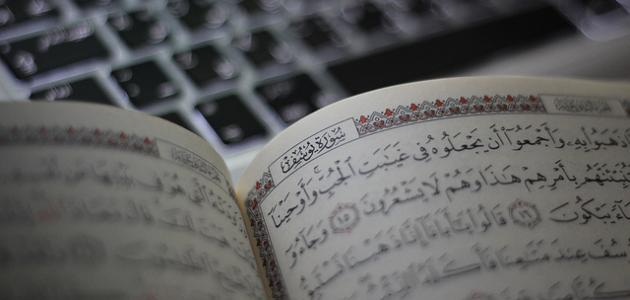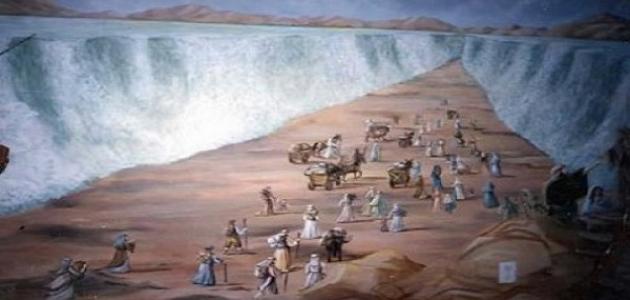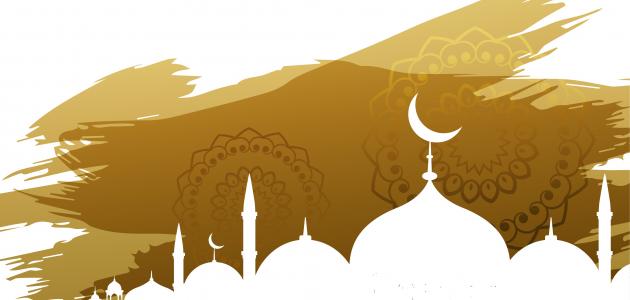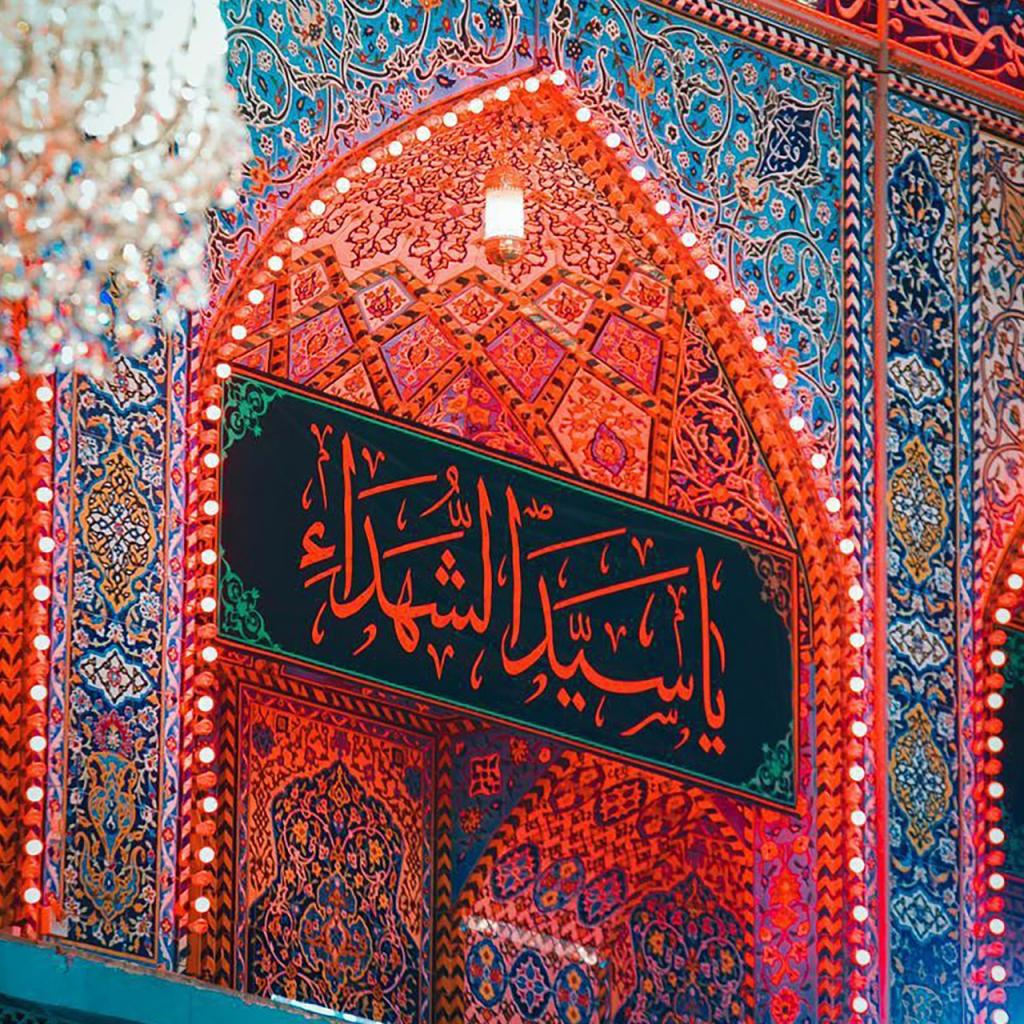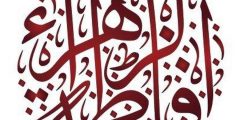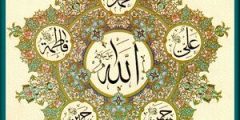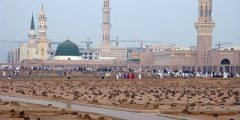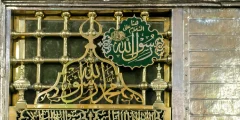groove holders
The owners of the groove are the subjects of the last kings of Himyar. He is Zar’ah bin Tabban Asaad Al-Himyari, known as Dhi Nawas. This king was a Jew, and a number of his subjects converted to Christianity. In order to force them to return from their religion, which they embraced, and give them a choice between killing, or returning to his religion, so they chose killing and patience for this ordeal, so grooves were cut for them *, and they were thrown into them, then they were set on fire until they were burned, and they died, and the king and his entourage looked at them. With regard to their number, it was said that they were seventy thousand, and it was said twenty thousand, and it was said twelve thousand. Therefore, God Almighty says in His Holy Book: (the owners of the groin were killed); That is, the owners of the trenches were cursed because of their heinous act, which is digging trenches and setting fire to the believers.
The boy and the monk
The Prophet - upon him be peace and blessings be upon him - told his companions about the story of a king from ancient times, and he was a king who had a close magician. When this magician advanced in age, he asked the king to send him a boy. So that he could teach him magic, so the king sent him a boy to teach him, and this boy was constantly going to the magician, and one day he came across a monk on his way to the magician, so he listened to his words and admired him, but the magician used to beat him. Because of his delay from him, the boy complained about that matter to the monk, who guided him to say to the magician when he asked him: “It was my family who kept me.” And if his family asked him, he would say: “The magician only kept me.” In himself: “Today I know the sorcerer better with God or the monk.” He said: “Oh God, if the monk’s affair is better with you than the sorcerer, then kill this beast with my stone.” The sorcerer commanded, then he went to the monk and told him what happened to him, so the monk told him that his affairs would be great, and that he would be afflicted during his life, and he asked him not to point to him if he was subjected to affliction.
Read also:Joseph's story in prisonThe boy and the king's babysitter
The matter of the boy reached a great extent, to the extent that he was curing people from their diseases, and curing the blind and the leper, God willing, and it is indicated that he followed this matter as a method of calling to the religion of God - the Almighty -; Where he used to pass by the people of affliction and disease, and he required them to enter into his religion, and to believe in God Almighty; Until he prays to God to heal them from their ailments, and there is no one left in his village who suffers from a disease but he becomes Muslim and follows his religion, so one of the king's courtiers heard of him and he was complaining of an illness, so he came to the boy with many gifts. In order to cure him of his illness, the boy told him: “I do not heal, but God heals.” He asked him to believe in God. Until God prays for him to heal, so the king’s babysitter believed in God, then the boy called for him and he was cured of his illness, except that the king noticed the recovery of his sitter from his illness, so he asked him about the reason for his recovery, and he said to him: “But God healed me.” The king was angry at his response; Because he was claiming divinity instead of God, so his sitter said to him: “Indeed, God is my Lord and your Lord.” So the king ordered him to be tortured until he showed the boy.
The boy and the king
After the king's companion showed the boy, the boy was brought until he stood with the king, so he ordered him to be tortured until he showed the monk, then the monk was brought and he ordered him to be tortured until he returned from his religion, but he refused, so he was cut in two with a saw until he died, then the king's seat was brought and tortured until he returned from his religion, but he refused Then a saw was brought, and it was cut in two halves until he died, then the boy was brought to him to return from his religion, but he refused, so the king ordered his followers to take him to the top of the mountain, and give him the choice between returning from his religion, or being thrown from the mountain. God saved them from their evil, as the mountain shook with them. So they returned to its bottom, then he returned to the king, so he realized his survival, so he ordered his companions to carry him in a ship until, if they were in the open sea, they threw him out of it. When the ship turned against them, they drowned and they all died, and the boy came out safely from among them, then the boy came to the king, and explained to him the impossibility of killing him except in one way, which is to crucify him on a trunk, then he gathers the people in one level, and takes an arrow from the boy's kinana *, and says: “In the name of God, the Lord of the boy,” then he shoots the arrow, so the king did what the boy asked for, and the boy shot the arrow, and it fell into his temple *, and he put his hand on his temple and died, so the people shouted: “We believe in the Lord of the boy.”
Read also:Who called people to pilgrimage to the house of GodGroove owners and king
Those whom the king gathered witnessed what happened to the boy, so they all believed in God Almighty. So the king was angry about that after what he was warning of occurred, so he ordered trenches to be dug in the city rails, and everyone who believed in the Lord of the boy was thrown into them, and they were set on fire. Because of their refusal to return from their religion, and the story of the owners of the groove included the position of the breastfeeding woman who was in the group of believers who were subjected to the test when the infidel king split the grooves for them, and bargained with them to storm the flames, or to return from their religion, and the accounts spoke about the position of that patient woman when she wanted to return About her position after she had pity on herself and her baby, so if the baby addressed her with words that instilled in herself strength and patience for that affliction, and among those words he said: “Be patient, mother, for you are on the truth.” In another narration, he urged her to proceed with her matter, storm the fire, and not alarm.
The story of the groove owners in the Holy Quran
The story of the people of Al-Ukhdood was mentioned in Surat Al-Buruj. The Almighty said in his dear book: (By the sky with the zodiac * and the Promised Day * and witness and witnessed * the people of the gully were killed * the fire with fuel * when they were upon it They sit * and they are witnesses of what they do to the believers * and they do not resent them except because they believe in God, the Mighty, the Praiseworthy * Who has the dominion of the heavens and the earth, and God is over all A witness * Indeed, those who persecuted believing men and women and then did not repent, for them is the punishment of Hell, and for them is the punishment of burning. Those who believe and do righteous deeds, for them are gardens beneath which rivers flow. That is the great victory.).
Read also:How God tortured the people of ThamudLessons learned from the story of the groove owners
A number of lessons can be learned from the story of Ashab al-Ukhdood, including:
- The importance of raising children, and raising them in a good way; The story of the owners of the groove included mentioning the personality of the boy who believed in God Almighty, renounced polytheism, and sacrificed himself so that all people would believe in God, and this indicates the importance of education. Because it produces a generation capable of renewing the religion and achieving victory for the nation over its enemies.
- Emphasis on the issue of the hearts’ attachment to God Almighty alone, so the human heart should not be attached to the actions of any human being; Because the hearts of the servants are subject to change and volatility, but the hearts should be linked to their Creator alone, and this was indicated by the position of the boy who was given by God Almighty the ability to heal the sick, and heal the blind and the leper. As he attributed that credit to God Almighty, and he did not pray for any of the sick except after he believed in God. So that souls realize that healing is in the hands of God alone.
- The existence of the corrupt lining around tyrants is a reality in every time and place; The story included mentioning the personality of the sorcerer who used to adorn his deeds for the king and help him against his falsehood. In order to achieve his interests, and his desires.
- The necessity of relying on God, and relying on Him in the whole matter; The boy's confidence in God Almighty was great, and this was indicated by his position when the king's followers took him to the top of the mountain. So that they would throw him away from him, so he prayed to his Lord to suffice him from their evil with whatever he wanted, and however he wanted, so God answered his call with his ability and planning.
- insistence on achieving the goal of calling to God; The boy was patient with the ordeal of affliction and killing, and every time the king's followers failed to kill him, he would return to the king to show him his inability to kill him. In order to achieve the goal of the call represented by the emergence of truth over falsehood, and people's faith in God Almighty.
- Statement of the truth of victory over the enemies; The story of the boy emphasized that victory does not necessarily mean the loss of the souls of the unbelievers, and the safety of the souls and money of the believers, but rather is related to victory through the achievement of goals; Because of the death of the boy, the faith of the people was achieved, and this is undoubtedly a victory. Because it achieves the goal of calling to God, just as the burning of the believers in the grottoes, and the loss of their lives is a victory as well; Because it is a sign of steadfastness on truth and principle, and disapproval of falsehood.
- Affliction is a divine year that does not change or change; God - Glory be to Him - afflicts people. so that he knows the truthful from the liar, and distinguishes the bad from the good; The path to Paradise is fraught with trials, as the Almighty said: (In order for God to distinguish the bad from the good, and to put the bad on top of one another, heap them all together, and put them in Hell. Those who are the last).
- Complete detachment from the fortunes of the human soul, and devotion to God Almighty; The monk told the boy that he was better than him when God gave him the ability to heal the sick, and explained to him that he would be afflicted in the way of his call, and he hoped that people would not point to him if he was subjected to affliction. Even though he knew it would cost him his life.
- The patience of the believers when they are subjected to harm and torture by the wrongdoers; The Prophet - upon him be peace and blessings be upon him - told his companions the story of the boy who was subjected to severe ordeal despite his young age, and that did not discourage him from his call. The story is that he associates with his companions, and strengthens their faith towards the trials and adversities they are exposed to, and the effects of that education appeared in the positions of the companions - may God be pleased with them - when they withstood torture and killing.

